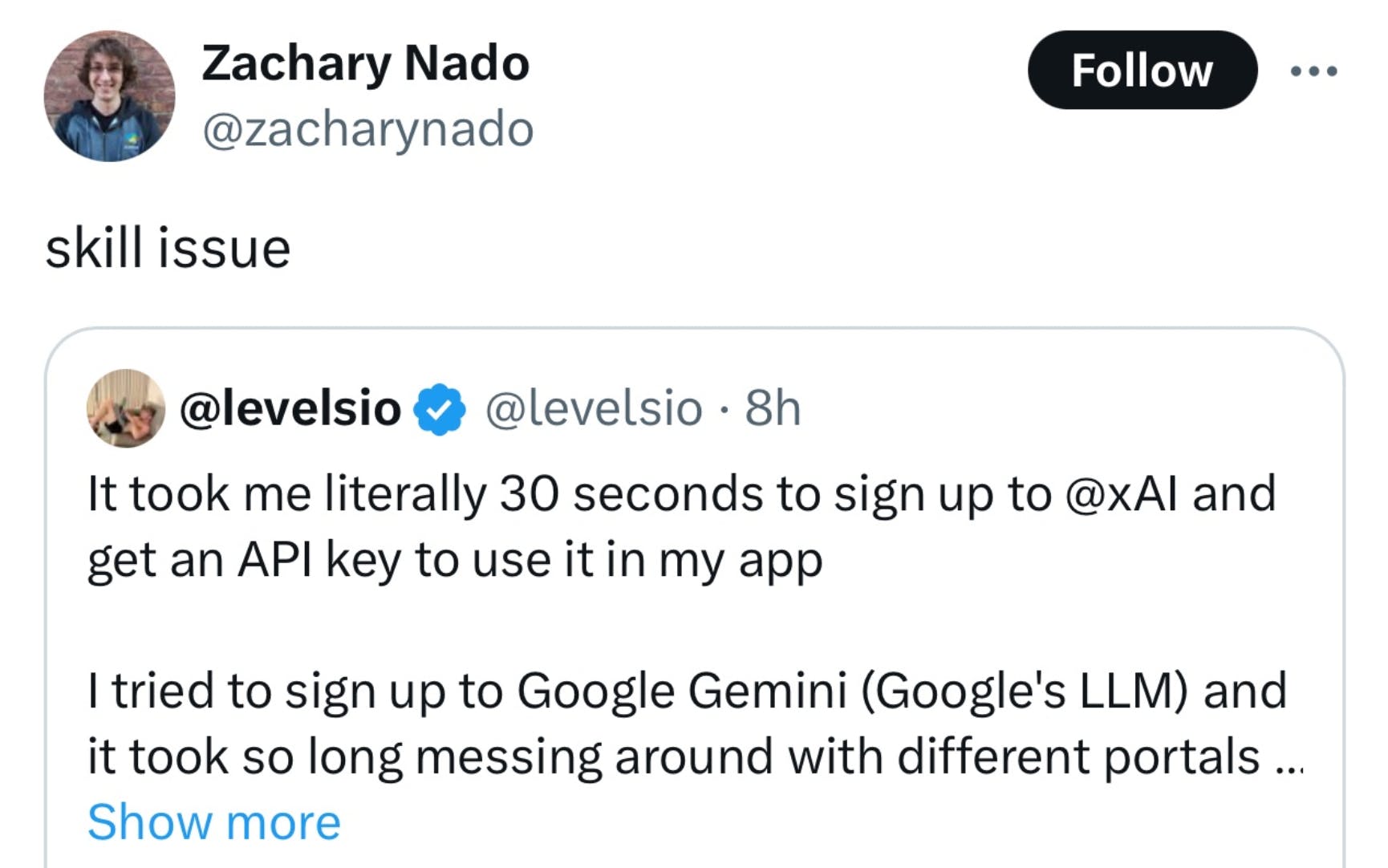Happy Sunday, gang. Welcome back to another packed edition of The Roundup. As per usual, we’ve got standout launches from the week (include a build-your-own SWE agent kit that claims to beat Devin), the rundown on the Pieter Levels/Google drama, and a spotlight on Supabase. Let’s get into it. — Sanjana and Aaron





X, formerly known as Twitter (and yes, I’ll keep reminding you), is still the place for unexpected drama. One minute, you’re tossing out a funny tweet, and the next, you’re at the center of an incident in the maker world.
Last week, for example, Pieter Levels, the most recognized Indie Maker around, tweeted his frustrations with Google Gemini—too many pop-ups, portals, libraries, and the like. Fed up, he decided to skip Google and go with xAI. All pretty standard, right? Just a tweet about product gripes.
Then a Google DeepMind engineer jumps in with a quick “skill issue.” Normally, that’d be a funny jab, but it didn’t sit well with Levels or his 500k+ followers. Things spiraled. The engineer doubled down, then eventually deleted the tweet. It finally started to settle when Logan Kilpatrick, product lead for Google AI, stepped in to address Pieter’s complaints and got to work clearing up those messy pop-ups and other frustrations.
Our take: We don’t have much of a take on this. It’s the usual Twitter banter gone bad story but in this case it ended up well. Honestly, Google may even come out of this looking better than before after Logan’s response. All's well that ends well.

As a startup founder, finding product-market fit is your top priority.
But landing bigger customers requires SOC 2 or ISO 27001 compliance—a time-consuming process that pulls you away from building and shipping.
That’s where Vanta comes in.
By automating up to 90% of the work needed for SOC 2, ISO 27001, and more, Vanta gets you compliant fast—opening doors to next-level growth opportunities.
Over 10,000 companies like Atlassian, Factory, and Chili Piper streamline compliance with Vanta’s automation and trusted network of security experts. Whether you’re closing your first deal or gearing up for growth, Vanta makes compliance easy.
A spotlight on launches that are a bit off-the-beaten track.
OpenVC Map: Google Maps for finding VCs.
OpenVC map lets you browse 1400+ investors directly on different city maps. You can filter by thesis or check size and build a shortlist or submit your deck directly through the platform.
Elqi: Track your dopamine and monitor your screentime.
Elqi estimates your dopamine levels by tracking your screentime and scrolling patterns. It makes you complete cognitive exercises (like deep breathing or puzzles) before you open connected apps.
Melies: Transform ideas into feature-length films.
Melies bills itself as an all-in-one film studio that lets you storyboard and produce feature-length films with cutting edge AI tools. It integrates GPT-4 and Claude for screenwriting, Flux for image generation, Runway/Kling/Luma for video generation, ElevenLab for sound, and so on.

(This is an excerpt from this week’s edition of The Breakpoint, our developer tools newsletter.)
Product Hunt users love Supabase; it’s currently the #5 most shouted-out tool by top makers on the site. Given the platform’s prominence in the modern developer’s toolbox, we thought it would be helpful to get a bit more granular about why people love Supabase so much. Why choose Supabase over another BaaS tool? What’s to like (or not to like) about it?
So, we sent out a survey to top makers who shouted-out the platform and asked them to say a bit more. Consider this article the first in a series of product explorations intended to help the community understand how and why developers choose to use the tools they do.
What did you use Supabase for?
“We used Supabase for our database and real-time functionality, specifically to enable live streaming data updates to our data table in Manaflow. This setup allows us to handle dynamic data effectively and keeps our users up-to-date with the latest insights without needing to reload or refresh.” — Ka Ling Wu, CEO and Co-founder of Upsolve AI, which provides customer-facing analytics as a service.
Why did you choose Supabase over competitors (and which competitors did you consider)?
“Supabase quickly caught our attention as an affordable and highly versatile solution. While Firebase was an option, our project required a relational database capable of handling complex joins, making PostgreSQL — and therefore Supabase — the clear choice. Right from the start, we found the admin dashboard intuitive and easy to work with, and both the Supabase community and internal support have been a huge plus.” — Team at Fixtured (#4 Product of the Day), a comprehensive sports calendar that covers over 50 competitions across major sports leagues.
That’s all for this week! As usual, hit us up at content@producthunt.co with any feedback.
